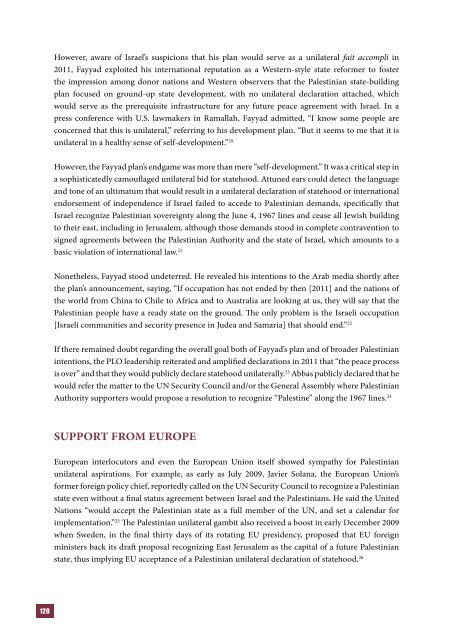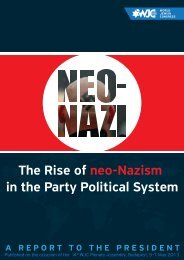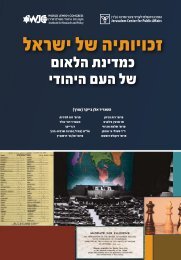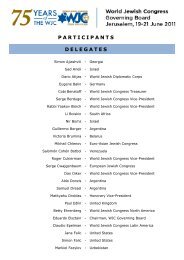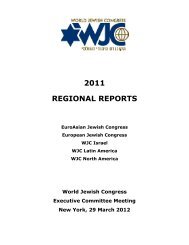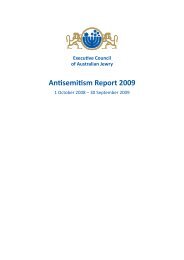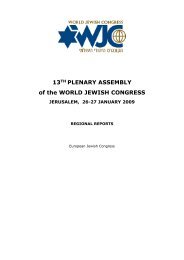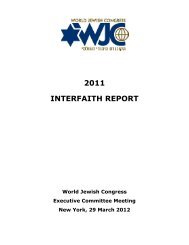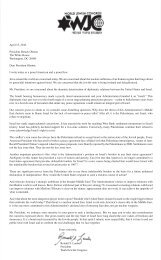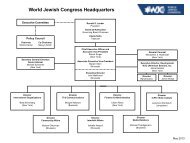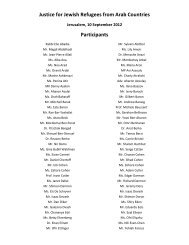Palestinian Unilateralism and Israel's Rights in Arab-Israeli Diplomacy
Palestinian Unilateralism and Israel's Rights in Arab-Israeli Diplomacy
Palestinian Unilateralism and Israel's Rights in Arab-Israeli Diplomacy
You also want an ePaper? Increase the reach of your titles
YUMPU automatically turns print PDFs into web optimized ePapers that Google loves.
However, aware of Israel’s suspicions that his plan would serve as a unilateral fait accompli <strong>in</strong><br />
2011, Fayyad exploited his <strong>in</strong>ternational reputation as a Western-style state reformer to foster<br />
the impression among donor nations <strong>and</strong> Western observers that the <strong>Palest<strong>in</strong>ian</strong> state-build<strong>in</strong>g<br />
plan focused on ground-up state development, with no unilateral declaration attached, which<br />
would serve as the prerequisite <strong>in</strong>frastructure for any future peace agreement with Israel. In a<br />
press conference with U.S. lawmakers <strong>in</strong> Ramallah, Fayyad admitted, “I know some people are<br />
concerned that this is unilateral,” referr<strong>in</strong>g to his development plan. “But it seems to me that it is<br />
unilateral <strong>in</strong> a healthy sense of self-development.” 20<br />
However, the Fayyad plan’s endgame was more than mere “self-development.” It was a critical step <strong>in</strong><br />
a sophisticatedly camouflaged unilateral bid for statehood. Attuned ears could detect the language<br />
<strong>and</strong> tone of an ultimatum that would result <strong>in</strong> a unilateral declaration of statehood or <strong>in</strong>ternational<br />
endorsement of <strong>in</strong>dependence if Israel failed to accede to <strong>Palest<strong>in</strong>ian</strong> dem<strong>and</strong>s, specifically that<br />
Israel recognize <strong>Palest<strong>in</strong>ian</strong> sovereignty along the June 4, 1967 l<strong>in</strong>es <strong>and</strong> cease all Jewish build<strong>in</strong>g<br />
to their east, <strong>in</strong>clud<strong>in</strong>g <strong>in</strong> Jerusalem, although those dem<strong>and</strong>s stood <strong>in</strong> complete contravention to<br />
signed agreements between the <strong>Palest<strong>in</strong>ian</strong> Authority <strong>and</strong> the state of Israel, which amounts to a<br />
basic violation of <strong>in</strong>ternational law. 21<br />
Nonetheless, Fayyad stood undeterred. He revealed his <strong>in</strong>tentions to the <strong>Arab</strong> media shortly after<br />
the plan’s announcement, say<strong>in</strong>g, “If occupation has not ended by then [2011] <strong>and</strong> the nations of<br />
the world from Ch<strong>in</strong>a to Chile to Africa <strong>and</strong> to Australia are look<strong>in</strong>g at us, they will say that the<br />
<strong>Palest<strong>in</strong>ian</strong> people have a ready state on the ground. The only problem is the <strong>Israeli</strong> occupation<br />
[<strong>Israeli</strong> communities <strong>and</strong> security presence <strong>in</strong> Judea <strong>and</strong> Samaria] that should end.” 22<br />
If there rema<strong>in</strong>ed doubt regard<strong>in</strong>g the overall goal both of Fayyad’s plan <strong>and</strong> of broader <strong>Palest<strong>in</strong>ian</strong><br />
<strong>in</strong>tentions, the PLO leadership reiterated <strong>and</strong> amplified declarations <strong>in</strong> 2011 that “the peace process<br />
is over” <strong>and</strong> that they would publicly declare statehood unilaterally. 23 Abbas publicly declared that he<br />
would refer the matter to the UN Security Council <strong>and</strong>/or the General Assembly where <strong>Palest<strong>in</strong>ian</strong><br />
Authority supporters would propose a resolution to recognize “Palest<strong>in</strong>e” along the 1967 l<strong>in</strong>es. 24<br />
Support from Europe<br />
European <strong>in</strong>terlocutors <strong>and</strong> even the European Union itself showed sympathy for <strong>Palest<strong>in</strong>ian</strong><br />
unilateral aspirations. For example, as early as July 2009, Javier Solana, the European Union’s<br />
former foreign policy chief, reportedly called on the UN Security Council to recognize a <strong>Palest<strong>in</strong>ian</strong><br />
state even without a f<strong>in</strong>al status agreement between Israel <strong>and</strong> the <strong>Palest<strong>in</strong>ian</strong>s. He said the United<br />
Nations “would accept the <strong>Palest<strong>in</strong>ian</strong> state as a full member of the UN, <strong>and</strong> set a calendar for<br />
implementation.” 25 The <strong>Palest<strong>in</strong>ian</strong> unilateral gambit also received a boost <strong>in</strong> early December 2009<br />
when Sweden, <strong>in</strong> the f<strong>in</strong>al thirty days of its rotat<strong>in</strong>g EU presidency, proposed that EU foreign<br />
m<strong>in</strong>isters back its draft proposal recogniz<strong>in</strong>g East Jerusalem as the capital of a future <strong>Palest<strong>in</strong>ian</strong><br />
state, thus imply<strong>in</strong>g EU acceptance of a <strong>Palest<strong>in</strong>ian</strong> unilateral declaration of statehood. 26<br />
120


